徐冬梅牛津英语M4U1导学案
- 格式:doc
- 大小:350.00 KB
- 文档页数:40
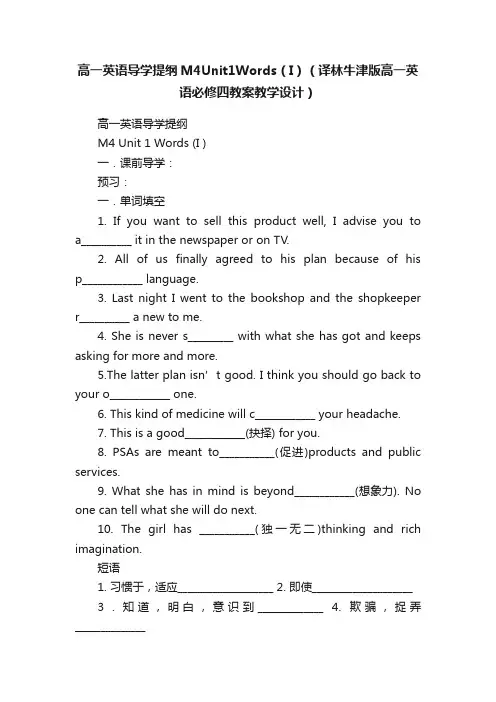
高一英语导学提纲M4Unit1Words(I)(译林牛津版高一英语必修四教案教学设计)高一英语导学提纲M4 Unit 1 Words (I )一.课前导学:预习:一.单词填空1. If you want to sell this product well, I advise you to a__________ it in the newspaper or on TV.2. All of us finally agreed to his plan because of his p____________ language.3. Last night I went to the bookshop and the shopkeeper r__________ a new to me.4. She is never s_________ with what she has got and keeps asking for more and more.5.T he latter plan isn’t good. I think you should go back to your o____________ one.6. This kind of medicine will c____________ your headache.7. This is a good____________(抉择) for you.8. PSAs are meant to___________(促进)products and public services.9. What she has in mind is beyond____________(想象力). No one can tell what she will do next.10. The girl has ___________(独一无二)thinking and rich imagination.短语1. 习惯于,适应___________________2. 即使____________________3.知道,明白,意识到_____________ 4. 欺骗,捉弄______________5.上…的当,受…的骗_______________ 6. 处理,对付______________7. . 自杀_ _________________________ 8. 对… 感到满意___________9. 诱使某人干某事_________________ 10. 反复地,一遍一遍地______二.预习中的问题拓展延伸:1. advertise v. ---___________n.(c) 广告商/---______ n. (c)广告_________广告活动,宣传n. [u]广告公司 _____________他们决定为他们的新产品做广告。
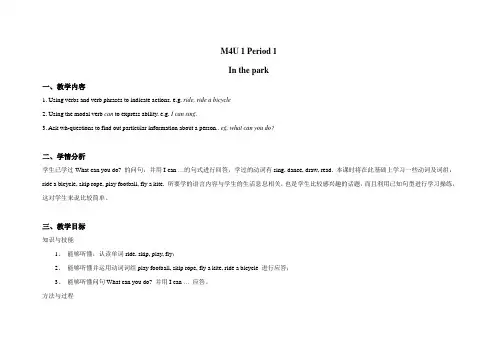
M4U 1 Period 1In the park一、教学内容1. Using verbs and verb phrases to indicate actions. e.g. ride, ride a bicycle2. Using the modal verb can to express ability. e.g. I can sing.3. Ask wh-questions to find out particular information about a person.. eg, what can you do?二、学情分析学生已学过What can you do? 的问句,并用I can …的句式进行回答,学过的动词有sing, dance, draw, read. 本课时将在此基础上学习一些动词及词组:ride a bicycle, skip rope, play football, fly a kite. 所要学的语言内容与学生的生活息息相关,也是学生比较感兴趣的话题,而且利用已知句型进行学习操练,这对学生来说比较简单。
三、教学目标知识与技能1、能够听懂,认读单词ride, skip, play, fly;2、能够听懂并运用动词词组play football, skip rope, fly a kite, ride a bicycle 进行应答;3、能够听懂问句What can you do? 并用I can …应答。
方法与过程1、创设情景,设定以公园为主线贯穿教学始终。
并将之前所学的句型和知识点融入到课文中;2、通过讲故事的形式导入新授,引入知识教学;3、通过歌曲、编儿歌、对子操练、大转盘游戏等各种方式进行词组及句型的巩固运用。
情感态度、价值观1、通过学习激发学生热爱生活,积极参加体锻活动以增强体质;2、在获取他人信息的过程中,促使学生形成乐于交友的良好品格;3、在活动的过程中促使学生形成乐于合作、勇于表达的良好品格。
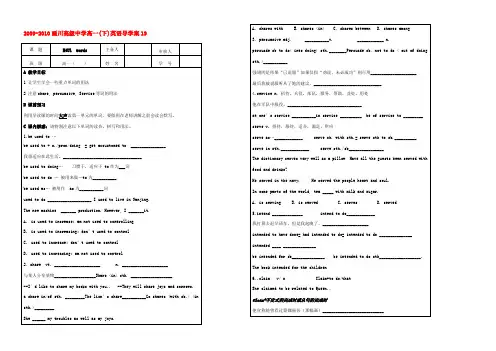
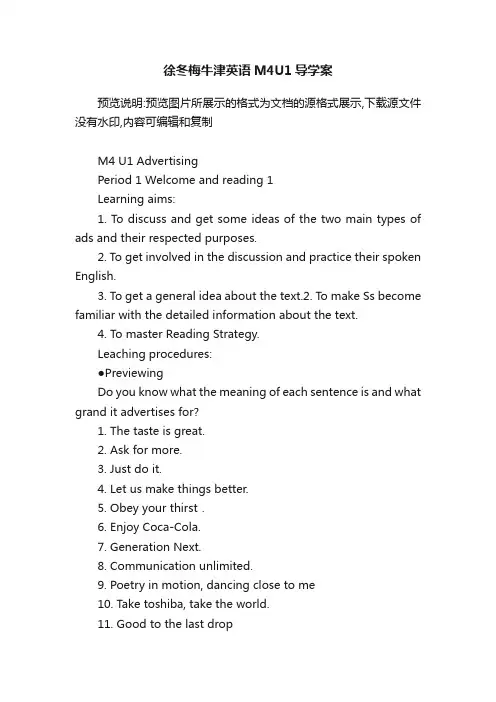
徐冬梅牛津英语M4U1导学案预览说明:预览图片所展示的格式为文档的源格式展示,下载源文件没有水印,内容可编辑和复制M4 U1 AdvertisingPeriod 1 Welcome and reading 1Learning aims:1. To discuss and get some ideas of the two main types of ads and their respected purposes.2. To get involved in the discussion and practice their spoken English.3. To get a general idea about the text.2. To make Ss become familiar with the detailed information about the text.4. To master Reading Strategy.Leaching procedures:●PreviewingDo you know what the meaning of each sentence is and what grand it advertises for?1. The taste is great.2. Ask for more.3. Just do it.4. Let us make things better.5. Obey your thirst.6. Enjoy Coca-Cola.7. Generation Next.8. Communication unlimited.9. Poetry in motion, dancing close to me10. Take toshiba, take the world.11. Good to the last drop12. No business too small, no problem too big13. Feel the new space.●Reading1、Fast-reading---skim the article and get the answer to each question.1. What?s an advertisement?2. How many types of advertising do you know according to the passage?3. Where can we find these ads?4. What are ads used for?5. What do advertisements encourage people to do?6. What does PSAs stand for?7. What are PSAs meant to do?8. When did China begin a nationwide public service advertising campaign?9. Why should we follow the advice in PSAs?2、Detailed-reading ---True for False1. Advertisements are found in many places.2. PSAs are only found in newspapers.3. All advertisements tell the complete truth.4. PSAs and commercial ads use some of the same methods.5. Commercial ads can give us valuable information about how to live our lives.6. An ad warning people against smoking is an example of a PSA.3、Note-taking---What are the similarities and the difference between commercial●Reading comprehensionChoose the correct answer according to the text.1. Which of the following is true according to this reading passage?A. All people enjoy seeing and hearing all kinds of advertisements.B. Many people think advertisements are the most important in their everyday life.C. Many people are quite used to seeing and hearing various advertisements.D. All advertisements give people very important information.2. The writer of this reading passage wants to ______.A. tell his readers what are advertisementB. share some important information about advertisements with readersC. tell his readers how important advertisements areD. tell his reader why people are used to seeing and hearing all kinds of advertisements3. Which of the following can not be regarded as an advertisement ______?A. …Yes to life, no to drugs.?B.…Project Hope---school every child.?C. …Good to the last drop.?D. …The car accident kil ls four passengers.?4. The main difference between commercial advertisements and public service advertisements is that ______.A. public service advertisements cost only a little money while commercial ones cost a lotB. public service advertisements deal with public issues but commercial ones don?tC. commercial advertisements sometimes deal with serious social problemsD. public service advertisements tell the complete truth but commercial ones don?t5. Some of the advertisements are clever because ______.A. they don?t tell the complete truth to customers though they don?t lieB. they use the most beautiful language and imagesC. they are made so beautiful and can be found almost everywhereD. they don?t tell lies directly to the customers6. Which of the following topics will be talked about in a public service advertisement ____?A. A new car factory that will be built in China next year.B. A good harvest of oranges is expected this year.C. Tea will take the place of coffee.D. A paper bag will make your home cleaner.ConsolidationFind the missing words and complete the following sentences according to the text.1. Advertisements use language and images to encourage customers to buy a product or service or in an idea.2. Advertisements can be into two major commercial advertisements and public service advertisements.3. Public service advertisements are used to people about health, safety or some other large issues.4. Not all commercial advertisements tell people the truth and sometimes some of they will play some on customers.5. Customers should be of the methods in advertisements totry and sell us things.6. The government sometimes uses public service advertisements, which are often used for , to educate people about some issues that public welfare.7. some commercial advertisements sometimes don?t lie, we should learn to be about them.8. All public service advertisements are meant to be and we should something from them.M4 U1 AdvertisingPeriod 2 Advertisement Reading 2 Language Focus Learning aims:To grasp the usage of some important words and expressions.Teaching important point:1. How to help the students be familiar with the language points.2. How to help Ss apply these points into practice.Language points:1. We are so used to them that we often do not even realize how many we see and hear in a day.比较:be used to do / doing sth. used to be used to do1)The new machine _____production. However I_____ it.A. is used to increase; am not used to controllingB. is used to increasing; don?t used to controlC. used to increase; don?t used to cont rolD. used to increasing; am not used to control 2)—Is that the small town you often refer to?—Right, just the one where you know I for years.(以前工作过)3)This is a woman who long hours and traveling extensively.(习惯于工作)4)Cotton over 40% of the world's textiles. (用来做)5)Used she (Did she use) to go to school by bike? Yes, she_____________________.2. I did some research on advertisements, and have some very important information to share with you.share vt. 分享,分担,共有;共同使用n. 1.一份 a share in/of sth. 一份… 2.股份;股票短语拓展:share (out) between/among 分配,分摊给……;share in sth. 分享某物;share (in) sth with /among/between sb. 与……分享(某物),将某事告诉(某人)do one?s share for 为……尽自己的一份力量;go shares (with) 平分;分享;完成句子:1)Sam and I .山姆和我合住一间房间。
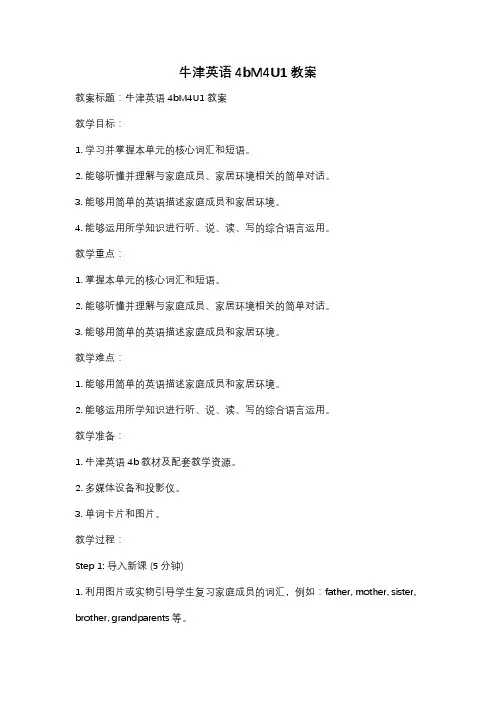
牛津英语4bM4U1教案教案标题:牛津英语4bM4U1教案教学目标:1. 学习并掌握本单元的核心词汇和短语。
2. 能够听懂并理解与家庭成员、家居环境相关的简单对话。
3. 能够用简单的英语描述家庭成员和家居环境。
4. 能够运用所学知识进行听、说、读、写的综合语言运用。
教学重点:1. 掌握本单元的核心词汇和短语。
2. 能够听懂并理解与家庭成员、家居环境相关的简单对话。
3. 能够用简单的英语描述家庭成员和家居环境。
教学难点:1. 能够用简单的英语描述家庭成员和家居环境。
2. 能够运用所学知识进行听、说、读、写的综合语言运用。
教学准备:1. 牛津英语4b教材及配套教学资源。
2. 多媒体设备和投影仪。
3. 单词卡片和图片。
教学过程:Step 1: 导入新课 (5分钟)1. 利用图片或实物引导学生复习家庭成员的词汇,例如:father, mother, sister, brother, grandparents等。
2. 引导学生回忆并描述自己的家庭成员。
Step 2: 新知呈现 (10分钟)1. 利用多媒体设备播放相关家庭成员和家居环境的图片,并教授新的词汇和短语,例如:cousin, aunt, uncle, living room, bedroom等。
2. 运用图片和实物示范,让学生理解新词汇的意思和用法。
Step 3: 听力训练 (15分钟)1. 播放录音,让学生听并理解与家庭成员、家居环境相关的简单对话。
2. 提问学生关于对话内容的问题,确保学生理解对话。
3. 分组练习,让学生模仿录音中的对话进行角色扮演。
Step 4: 口语练习 (15分钟)1. 将学生分成小组,让他们自由交流关于自己家庭成员和家居环境的信息。
2. 鼓励学生使用所学词汇和短语进行描述。
3. 教师巡回指导和纠正学生的口语表达。
Step 5: 阅读和写作训练 (15分钟)1. 学生阅读教材中与家庭成员和家居环境相关的短文,并回答相关问题。
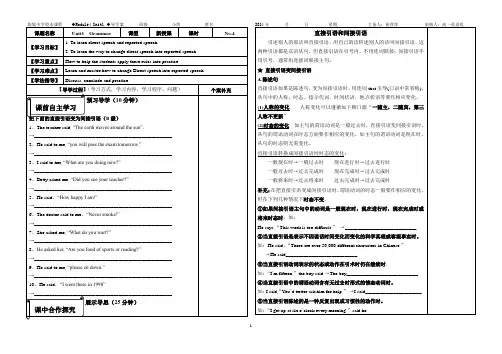
Period 41.The teacher said that the earth moves around the sun.2.He said to me that I would pass the exam the next day.3.I said to her what she was doing then.4.Betty asked me if / whether I had seen the teacher.5.He said how happy he was.6.The doctor asked / ordered / advised me not to smoke.7.She asked me what I wanted. 8.He asked her whether she was fond of sports or reading.9.He asked me to sit down. 10.He said that he went there in 1998.①He says that that work is too difficult.②He said that there are over 50,000 different characters in Chinese.③The boy said that he is fifteen. ④I said that you’d better ask him for help.⑤He said that he gets up at six o’clock every morning.⑥He said that when he lived in America, he often saw Tom.⑦My friend said that he was born in 1982.⑧She said that she had lived in a small village before he came here.(1) He asked me if / whether I was ready. (2)He asked me what I said.(3) He asked me whether they were teachers or students.1. C2.D3.D4.B5.C6.B。
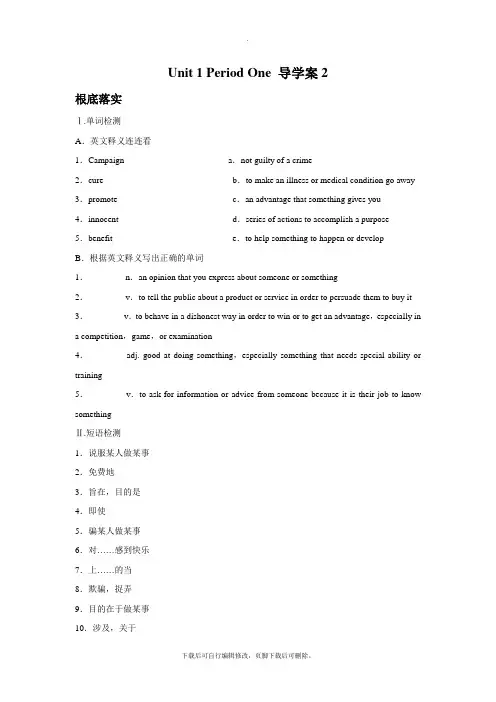
Unit 1 Period One 导学案2根底落实Ⅰ.单词检测A.英文释义连连看1.Campaign a.not guilty of a crime2.cure b.to make an illness or medical condition go away 3.promote c.an advantage that something gives you 4.innocent d.series of actions to accomplish a purpose 5.benefit e.to help something to happen or developB.根据英文释义写出正确的单词1.________ n.an opinion that you express about someone or something2.________ v.to tell the public about a product or service in order to persuade them to buy it 3.________ v.to behave in a dishonest way in order to win or to get an advantage,especially in a competition,game,or examination4.________ adj. good at doing something,especially something that needs special ability or training5.________ v.to ask for information or advice from someone because it is their job to know somethingⅡ.短语检测1.说服某人做某事________________2.免费地________________3.旨在,目的是________________4.即使________________5.骗某人做某事________________6.对……感到快乐________________7.上……的当________________8.欺骗,捉弄________________9.目的在于做某事________________10.涉及,关于________________Ⅲ.用所给词的适当形式填空1.I am used to ________ (get) up early and taking an hour’s walk before breakfast.2.Her success encouraged me ____________ (try) the same thing.3.There are too many TV ______________ (advertise) in between the program.4.He doesn’t mind. In fact,he is even ________ (please).5.He aims ____________ (be) a successful writer.6.I was out of ________ (breathe) after running for the bus.7.The ________ (origin) picture is in the British Museum.8.I was meant ____________(work) on Sunday,but I just fooled around all day.Ⅳ.选词填空be used to,be meant to,fall for,play tricks on,be aware of,deal with,agree with,come to 1. Be careful not to ____________ such nonsense.2.We don’t know how to ________________ the polluted river.3.It’s so hot here,but I think I will ______________ the weather.4.I don’t ________________ you on this arrangement.5.When it ______________ playing basketball,he is the champ.6.We ________ fully ____________ the danger of smoking.7.This software ________________ protect computers from being attacked by viruses.8.The boys like ____________________ their classmates.Ⅴ.单项填空1.He advertised ________ a job in the newspapers.A.for B.to C.at D.with2.The government is trying to do something to ________ better understanding between the two countries.A.raise B.promoteC.heighten D.increase3.—The exam wasn’t difficult at all,was it?—No,but I don’t believe ________ could pass it.A.somebody B.anybodyC.everybody D.nobody4.—Ouch!You hurt me!—I am sorry. But I ________ any harm. I ________ to drive a rat out.A.didn’t mean;triedB.don’t mean;am tryingC.haven’t meant;triedD.didn’t mean;was trying5.I don’t know how to ________ these naughty boys.A.do with B.deal withC.play with D.connect with6.—Mr.President,can you predict who will win in the election?—________!I will not say anything about it at present.A.No way B.No wonderC.No doubt D.No comment7.________ it’s a little bit hard for some of us to copy the standard English accent,we still communicate with foreigners very well.A.As if B.Even ifC.Now that D.As long as8.He was a heavy smoker.I ________ him to give up smoking but he just wouldn’t listen to me. A.suggested B.tried to persuadeC.persuaded D.managed9.I________ to your party,but I was prevented by the heavy rain.A.had meant comingB.meant to have comeC.have meant to comeD.meant coming10.—Lend me five pounds and I’ll buy you a drink.—Oh no,I’m not ________ that trick.A.falling for B.falling downC.falling to D.falling behind11.Can’t we just live in today,________ the worries of tomorrow or the regrets of the rest?A.free from B.aware ofC.sure of D.tired from12.Who is most likely to ________ the old lady’s death?A.benefit B.benefit fromC.be beneficial D.be beneficial to13.It never ________ to me that a top student like her should have failed in the exam. A.happened B.appearedC.sounded D.occurred14.His writing is so confusing that it’s difficult to make out ________ it is he is trying to express. A.that B.how C.who D.what15.The road conditions there turned out to be very good,________ was more than we could expect.A.it B.whatC.which D.that能力提升阅读理解Simona lives in Bucharest,Romania. She is nine years old and HIV-positive. When Simona’s mother found out about her illness five years ago,her first reaction was to tell everyone,looking for support.“That’s when I found out who really was my friend,and who wasn’t,〞she said. “Quite a few people stopped visiting me and asked their children not to play with Simona anymore. Because of this,quarrels began in my family. My husband became more and more unfriendly towards me and towards Simona with each trouble brought about by her diagnosis. He didn’t understand how important it was for Simona to receive regular examinations by a doctor or why she needed proper treatment for her sickness.〞When her mother tried to enroll(登记) Simona in school,the teacher warned her that when other parents found out about her illness she would be shunned by the other children.Simona’s mother looked for help and found a socia l worker from the Community Resource Center. The social worker helped her enroll Simona in another school and provided emotional,financial,and material support for the family. Simona’s parents were able to ease the tension in the family. Her mother also now attends parenting classes and support groups at the Community Resource Center.The Community Resource Center not only provides much needed resources,it also provides a place where women can gain skills and self-confidence. It provides children with a place where they are accepted—regardless of their health status or their ethnicity. At the center parents and children find a place where they can grow and find the support they need to stay together and care for each other.1.Many people prevented their children playing with Simona because________.A.Simona had no true friendsB.Simona was a naughty girlC.Simona was HIV-positiveD.Simona was loved by nobody2.Simona’s father thought that Simona________.A.shouldn’t bring so much trouble to themB.should receive examinations regularly by a doctorC.should never see the doctor for her sicknessD.should be treated properly for her sickness3.Which one of the following is NOT true according to this passage?A.Simona has been living with HIV for five years.B.Few people visited Simona’s mother for Simona’s illness.C.Simona’s mother received help from a social worker.D.Simona was admitted finally by the first school.4.The underlined word “shunned〞in the third paragraph means________.A.refused B.avoidedC.accepted D.received答案根底落实Ⅰ5.consultⅡ.1.persuade sb.to do sth. 2.for free 3.be meant to 4.even if/though 5.fool sb.into doing sth. 6.feel pleased with7.fall for8.play tricks on9.aim to do sth.10.deal withⅢ5.to be 6.breath7.original8.to workⅣ.1.fall for 2.deal with 3.be used to 4.agree with 5 es to 6.are;aware of7.is meant to8.playing tricks onⅤ.1.A2.B3.C4.D5.B6.D7.B8.B9.B10.A11.A12.B 13.D14.D15.C能力提升1.C2.A3.D4.B。
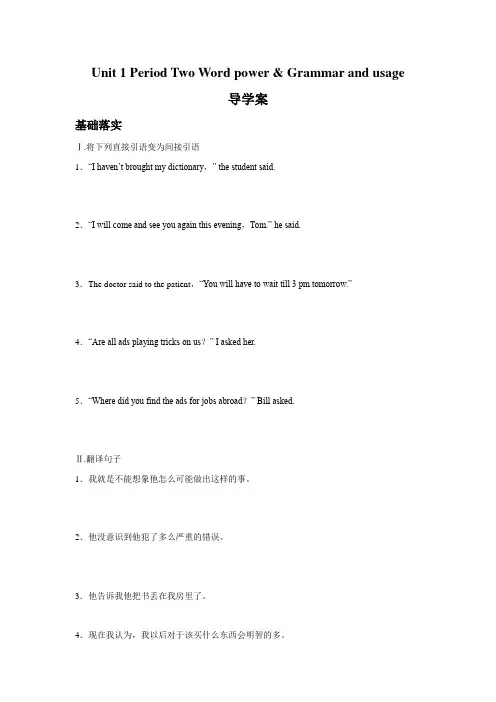
Unit 1 Period Two Word power & Grammar and usage导学案基础落实Ⅰ.将下列直接引语变为间接引语1.“I haven’t brought my dictionary,” the student said.________________________________________________________________________________________________________________________________________________ 2.“I will come and see you again this evening,Tom.” he said.________________________________________________________________________________________________________________________________________________ 3.The doctor said to the patient,“You will have to wait till 3 pm tomorrow.”________________________________________________________________________________________________________________________________________________ 4.“Are all ads playing tricks on us?” I asked her.________________________________________________________________________________________________________________________________________________ 5.“Where did you find the ads for jobs abroad?” Bill asked.________________________________________________________________________________________________________________________________________________ Ⅱ.翻译句子1.我就是不能想象他怎么可能做出这样的事。
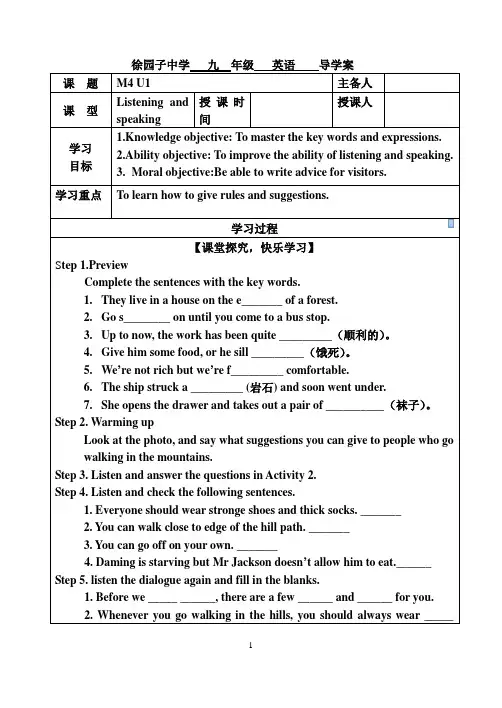
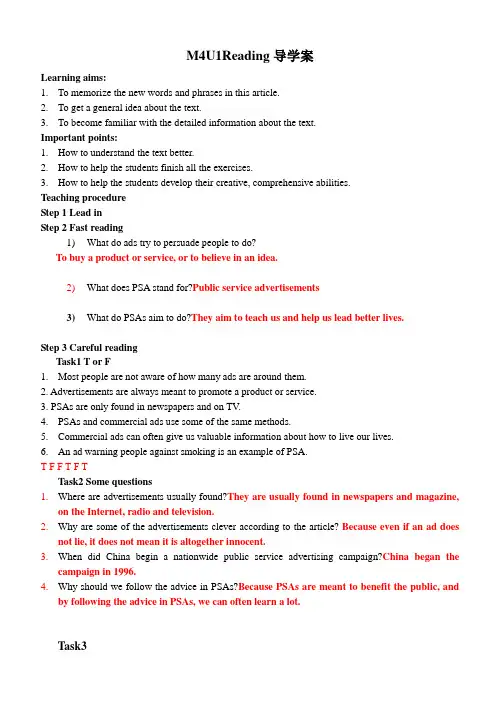
M4U1Reading导学案Learning aims:1.To memorize the new words and phrases in this article.2.To get a general idea about the text.3.To become familiar with the detailed information about the text.Important points:1.How to understand the text better.2.How to help the students finish all the exercises.3.How to help the students develop their creative, comprehensive abilities.Teaching procedureStep 1 Lead inStep 2 Fast reading1)What do ads try to persuade people to do?To buy a product or service, or to believe in an idea.2)What does PSA stand for?Public service advertisements3)What do PSAs aim to do?They aim to teach us and help us lead better lives.Step 3 Careful readingTask1 T or F1.Most people are not aware of how many ads are around them.2. Advertisements are always meant to promote a product or service.3. PSAs are only found in newspapers and on TV.4.PSAs and commercial ads use some of the same methods.mercial ads can often give us valuable information about how to live our lives.6.An ad warning people against smoking is an example of PSA.T F F T F TTask2 Some questions1.Where are advertisements usually found?They are usually found in newspapers and magazine,on the Internet, radio and television.2.Why are some of the advertisements clever according to the article? Because even if an ad doesnot lie, it does not mean it is altogether innocent.3.When did China begin a nationwide public service advertising campaign?China began thecampaign in 1996.4.Why should we follow the advice in PSAs?Because PSAs are meant to benefit the public, andby following the advice in PSAs, we can often learn a lot.Task3Step 4 Reading strategy1.What is expository writing meant to do?It is meant to introduce you to basic information on a topic.2.What is its basic format?Introduction of the subject, examples and facts that develop or support the details, conclusion. Step 5 Discussion1. Do you think young people are easily persuaded by ads? Why or why not?2. What is the best PSA you have ever seen? Why do you think it is so good?Step 6 Homework1.Read the passage again and again.2.Try to keep the new words in mind.Language pointsDifficult sentences1. We are so used to them that we often do not even realize how many we see and hear in a day. So…that…引导结果状语从句,意为“如此···以至于···”常用句式:so +adj./adv.+thatso +adj. +a(n)+单数名词+thatso +many/few+复数名词+thatso +much/little+不可数名词+thatHe runs _______ _______ _______nobody can catch up with him.他跑得非常快,以至于没人能追上他。
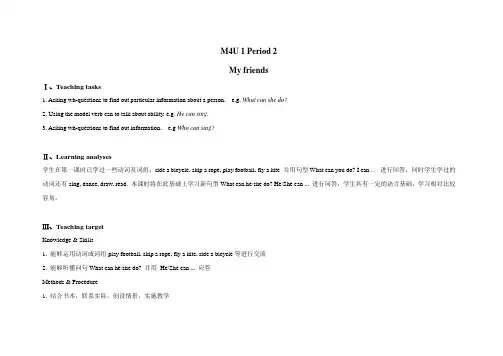
M4U 1 Period 2My friendsⅠ、Teaching tasks1. Asking wh-questions to find out particular information about a person. e.g. What can she do?2. Using the model verb can to talk about ability. e.g. He can sing.3. Asking wh-questions to find out information. e.g Who can sing?Ⅱ、Learning analyses学生在第一课时已学过一些动词及词组:ride a bicycle, skip a rope, play football, fly a kite 并用句型What can you do? I can …进行回答,同时学生学过的动词还有sing, dance, draw, read. 本课时将在此基础上学习新句型What can he/she do? He/She can ... 进行问答,学生具有一定的语言基础,学习相对比较容易。
Ⅲ、Teaching targetKnowledge & Skills1. 能够运用动词或词组play football, skip a rope, fly a kite, ride a bicycle等进行交流2. 能够听懂问句What can he/she do? 并用He/She can ... 应答Methods & Procedure1. 结合书本,联系实际,创设情景,实施教学2. 通过编儿歌、对子操练、猜谜游戏、调查活动等各种方式进行词组及句型的巩固运用3. 加强对学生的听力训练和说话能力训练Emotion & Attitude & Value1. 在获取他人信息的过程中,促使学生形成乐于交友的良好品格2. 在活动的过程中促使学生形成乐于合作、勇于表达的良好品格Ⅳ、Key points & difficult points1. 能够听懂问句What can he/she do? 并用He/She can ... 应答Ⅴ、Teaching procedure1. Pre-task preparation(1) Greeting(2) listen and enjoy(3) review the lesson. ‘L isten and act’①listen ②read after the video ③close eyes and listen again.2. While-task procedure(1) show the picture and play the animation(2) learn ‘what can she/ he do?’【show the animation and practice the verb phrases and sentences.】①This is Alice. She is a girl.She is fat.What can she do? She can ride a bicycle.②This is Tom. He is a boy. He is tall.What can he do?He can sing a song.③This is Danny. He is a boy. He is super.What can he do?He can draw. 【explain the meaning of super in different sentences.】④This is Kitty. She is nice.What can she do?She can dance. 【explain the meaning of nice in different sentences.】⑤Who is she?Oh! It’s me.What can you do?I can skip a rope!(3) learn ‘who can…?’Review the information of above five kids. Teacher ask and students answer. 【have a competition in groups】Who can ride a bicycle?Alice can ride a bicycle.Who can sing? Tom can sing.Who can draw? Danny can draw.Who can dance? Kitty can dance.Who can skip a rope? I can skip a rope.3. Post-task activity(1) play a game. Guess and say. (P40)What can he/ she do?She can ride a bicycle.He can fly a kite.She can dance.He can play football.He can skip a rope.She can draw.(2) who is your friend?①play a video. Help students to say more abilities.②Work in pair. One ask and one answer.What can you do? I can….(3) make a report according to the practices.Report(报告):______ is my friend. He/She can_____. He/She can___________. He/She can___________. He/She’s super.4. Assignment(1) Review the words on P39.(2) Recite the lesson on P38, P39.(3) Draw a picture on Students’ book on P41 and introduce she/ he.Ⅵ、Board WritingM4U1 Period 2My friendsThis is_______.What can he/ she do?He/ She can______.Ⅶ、Teaching Reflection。
课题:Module 1 The natural world Unit 1Wild animals P1 Listen and say
说明:1、格式:下发的表格样式及内容不要更改,课题为宋体二号字,内容宋体小四号字,字体常规不加粗。
段落行距为1.5倍行距 2、内容:学习目标、教学重难点写清为此,要少而精。
流程内容根据情况而定,一节课尽量备两页,便于整体效果。
3、备课时留出学生做题空间。
4、盘点收获:老师写板书设计及教学反思,学生写自己的课堂得失。
(课堂新方案可供参照)
课题:Module 4 The natural world Unit 1Wild animals P2Look and read
、我会译。
说明:1、格式:下发的表格样式及内容不要更改,课题为宋体二号字,内容宋体小四号字,字体常规不加粗。
段落行距为1.5倍行距 2、内容:学习目标、教学重难点写清为此,要少而精。
流程内容根据情况而定,一节课尽量备两页,便于整体效果。
3、备课时留出学生做题空间。
4、盘点收获:老师写板书设计及教学反思,学生写自己的课堂得失。
(课堂新方案可供参照)。
Unit 1 Period Four 导学案根底落实Ⅰ.课文理解1.What should be done first to determine the target audience?A.Do a little research.B.Create the message for the right people.C.Know what the audience already think.D.Get to know the audience.2.How can a researcher know the way the audience will react?A.Planning some questions.B.Talking with the audience.C.Gathering information from the research.D.Guessing how the audience will react.3.The advertising way depends on ________.A.how well you do your researchB.who your target audience areC.which kinds of ads are the bestD.both B and C4.The correct order to build an ad can be ________.a.decide the target audienceb.know what the audience have in mindc.gather information from the researchd.do a little researche.decide what approach to useA.a;b;c;e;d B.d;c;b;a;e C.e;b;c;a;d D.d;c;a;e;b Ⅱ.单词检测1.v.确定,查明________有吸引力;呼吁________做出反响,回应________使震惊________敦促,力劝________分析,分析结果________烟草________]4.adv.个别地;本人,亲自________Ⅲ.短语检测1.弄清楚;计算出________________2.吸引;呼吁________________3.下决心做某事________________4.把……表达清楚________________5.某人使受震惊而处于…… ________________6.死于…… ________________Ⅳ.语境填词1.I will ________ (亲自) visit him some day.2.Many ________ (有毒的) plants can be made into medicine.3.The salesman ________ (敦促) me to buy a new car.4.He presented a detailed ________ (分析) of the trend in education.5.The book will ________ (吸引) only to a limited public.6.His future has not yet been ________ (决定),but he may study medicine.7.This book will be the ________ (目标) of bitter criticism.8.The news was a ________ (震惊) to us.Ⅴ.选词填空be meant to,be concerned with,appeal to,even if,fall for,figure out,get across,depend on 1.Project Hope ________________ help the poor children to complete compulsory education. 2.________________ we achieve great success in our work,we should not be proud.3.Be smarter not to ________________ such a trick again!4.His latest documentary ____________________ youth unemployment.5.The UN called on the two sides to solve the conflict by talking rather than ________________ force.6.It will take me some more time to ______________ the present complex situation.7.I spoke slowly,but my meaning didn’t __________.8.Children ________________ their parents for food and clothing.Ⅵ.句型转换1.The railway will benefit several provinces along.→Several provinces will ________ ________ the railway.2.The police are calling for the public for any information about the murder victim.→The police are ________ ________ the public f or any information about the murder victim. 3.He really didn’t catch the meaning of what the professor said.→He really didn’t ________ ________ what the professor said.4.Jim didn’t make up his mind to go abroad for further study.→Jim didn’t ________ to go abroad for further study.Ⅶ.单项填空1.They have ________ most carefully the time and money needed to complete the project. A.picked out B.taken outC.left out D.figured out2.—Do these paintings ________ you?—No,not really. They don’t mak e sense to me at all.A.interesting to B.appeal toC.interested in D.appeal for3.She said she didn’t like Jim,but ________,I thought he was an honest boy,though sometimes careless.A.naturally B.personallyC.surprisingly D.fortunately4.The vacation is coming and I have a(n) ________ to travel abroad.A.will B.wish C.excuse D.urge5.We should get this problem ________ to him and then we can start.A.in B.on C.with D.across6.We haven’t discus sed yet ________ we are going to place our new furniture.A.that B.which C.what D.where7.________to give up smoking,he threw away his ________cigarettes.A.Determined;remainedB.Determined;remainingC.Determining;remainedD.Determining;remaining8.It was ________ great shock to us that as ________ average student he was admitted into a key university.A.a;/ B.the;theC.a;the D.a;an9.We are wondering why more and more people die ________ cancer nowadays.A.of B.from C.down D.out10.I made a promise to myself ________ this year,my first year in high school,would be different.A.whether B.what C.that D.how能力提升阅读理解Here is a poster—on a middle school website. Read the website poster.Going,Going,Gone!The Haynes Middle School Parent-teacher OrganizationInvites you to attend our latest fund-raiserThe Fourth Annual Haynes School Auction(拍卖)Saturday,May 106∶00 p.m.—11∶00 p.m.in the school hall6∶00 p.m.—6∶30 p.m.:All items for auction are previewed(预览).6∶30 p.m.—7∶00 p.m.:Silent auction begins.7∶00 p.m.—7∶30 p.m.:Highest bidders(出价人)from silent auction are determined.7∶30 p.m.—11∶00 p.m.:Main auction begins.Items up for bid in the main auction include the following:1.Airline tickets to a place of your choice2.Weekend getaways at first-class hotels3.Season tickets to the Chicago Bears football game4.$50 gift tickets to local gift shops,restaurants,and salons5.Theater tickets to The Merchant of VeniceDon’t miss the boat!Book your tickets today.Last year,tickets were sold out in five days!Tickets are sold on a first-come,first-served basis.$15.00 per personAll the money from the auction will be given to the Haynes School computer lab. 1.Which of the following is NOT mentioned as being up for bid at the auction?A.A movie passes to the local cinema.B.A weekend stay at a hotel.C.A ticket to a restaurant.D.Airline tickets.2.The more items that are given or bought for auction,________.A.the less money that will be charged for the tickets to the auctionB.the more money that can be raised to support the computer labC.the faster the ticket will be sold to the auctionD.the higher the value that will be placed on the items in the silent auction 3.The phrase “firstcome,first-served〞tells you that ________. A.people can buy the tickets on the first day onlyB.the person who is first to arrive will receive a ticket at no chargeC.food and drinks will be served at the auctionD.tickets are sold in the order of who arrives first to buy them4.Which of the following is most likely to happen at the year’s auction?A.The airline tickets will receive higher bids than any other item.B.All items up for bid will be sold for at least twice their value.C.More money will be raised this year than in any other year before. D.Tickets for the event will be sold out in less than one week.答案根底落实ⅠⅡⅢ.1.figure out 2.appeal to 3.be determined to do sth. 4.get something across 5.shock sb.into (doing) sth. 6.die fromⅣⅤ.1.is meant to 2.Even if 3.fall for 4.is concerned with 5.appealing to 6.figure out 7.get across 8.depend onⅥ.1.benefit;from 2.appealing;to 3.figure;out 4.determineⅦ.1.D2.B3.B4.D5.D6.D7.B8.D9.A10.C能力提升1.A2.B3.D4.D。
牛津小学英语4AUnit1MayIhave…-导学案导学案4AUnit1mayIhave第一课时学习目标:.知识目标:我们通过这节课的学习,要能听、说、读、写B版块的九个单词和c版块的句型;2.能力目标:学完这一课,我们要能正确地运用日常交mayIhaveye./Sure.Hereyouare.3.情感目标:在学习的过程中了解如何用英语婉转地向别人要东西。
学习内容:.通过预习,我们要会认读B版块的大部分单词,并初步了解B部分单词都是学习用品,并能回忆出一些以前学过哪些关于此类的单词。
2.本节课我们要熟练掌握词汇有:aballpen,apencilcae,abookmark,anotebook;要熟练掌握句型有:mayIhaveye./Sure.Hereyouare.3.通过本节课的学习我们要能正确地运用mayIhave句型问答。
学习过程:一、新知链接:.预习内容:词汇:A.听磁带,预习下面的单词,并注意划线部分的读音,如果右侧II 栏里有相同读音的单词,就把它的序号写在本课新单词的横线上。
III①.arulerA.book②.arubberB.blue③.abookmarkc.tudy④.anotebookD.park⑤.apencilcaeE.no⑥.aballpenF.crayonB.除了本课要学的anotebook,你还知道哪些以book结尾的单词?想一想,把他们写下来。
abookabookc.你还知道哪些以pencil开头的单词?想一想,写一写。
如:apencilcaeapencilapencil句型:看图,编写一段对话。
A:mayIhaveB:Sure.2.预习反馈:根据提示,完成下列句子。
①.Thiia________.Thatia_________.②.my________ired,andmy___________igreen.③.what'thiIt'a____ _______.④.A:mayIhavea_______________B:_______.⑤.A:mayIhaveome?B:ye.Here.二、学习.引领学习A.看着卡片,跟着老师或录音机读B部分单词,纠正容易发错的音。
Unit 1 Period Three 导学案根底落实Ⅰ.单词检测1.v.推荐;建议________购置,采购________成倍增加;乘以________设计________更新________讨价还价________(大)公司________青春;青年________方面________毕业年级的,级别(或地位)高的________精致的;绚丽的________Ⅱ.短语检测1.如你所知______________2.考虑做某事______________3.确保______________4.为……设计______________5.与某人就……进展讨价还价______________Ⅲ.语境填词1.We ________ (讨价还价) with the farmer for a supply of milk and butter. 2.6________ (乘) by 5 is 30.3.We should try to grasp the main ________ (方面) of a matter.4.What is your ________ (秘诀) for success?5.The workers got a Christmas ________ (津贴).6.Dragons are creatures of Chinese ________ (梦想).7.The speech has been corrected and ________ (提供最新信息) after last-minute reports from abroad.8.BBC is short for the British Broadcasting ________ (公司).Ⅳ.选词填空go up,remain the same,be bored with,up to,decrease by1.Recently the housing price ________________ to 3,000 yuan per metre.2.The production in this month ________________ 18.2 per cent.3.The employees ________________ so long work now.4.The temperature reached ____________ 40℃in this area in this summer.5.The village __________________,which amazed us.Ⅴ.完成句子1.我很懊悔没有听从你的建议。
课时Period 1 上课 时间 _____________________ A. 我会听说读写四会单词:jungle, crocodile, zoo, zoo-keepero 学习can 表示“能够”。
主备人 M4U1 Wild animals 展示自我(准备内容一组内展示一汇报)学习目标 学习重点 掌握四会单词,理解课文意思。
学习难点can 表示“能够”。
时间预设小检测多——自学、对学、群学20'——展示10'——达标测评5'学习流程:Step 1 Check1. Sing a song .2. 说说你知道的动物Step 2 Presentation第一关:1. 自读课文,用红笔画出不会读的单词。
2. 听录音跟读,自己朗读单词,解决第一次不会读的单词。
3. 自读课文,理解课文大意,画出不懂的句子或词语。
4. 听录音,跟读。
第二关:1. 听录音,感知对话内容。
2. 自读对话,找出自己不会的单词或句子。
Step 3 Cooperation1. 小组合作学习,组长领读,对子帮扶。
2. 对子之间赶紧来PK 读课文吧!相信课文你已经练习的很熟练了,怎么样?不要犹豫啦,用你们小组的展示方式大Step 3 Show达标测评 (互改一改错一白评、互评一汇报)★补全单词并写出汉语意思 j.ngle ( ) ★★选择填空cro_odile( zoo-k_per( ) 胆的 SHOW 出来吧! Come on! You are the best!A Task 1.我是单词朗读拼写小能手。
Task 2,我是小小讲解员:讲一讲本课课文大意及重点句型。
Task 3.我是课文朗读精英,用流畅优美的语音语调朗读课文。
1. —you swim in the swimming pool ?一No , I can't.A. DoB.HaveC.Can2. Tim likes basketball.A.playB.playingC. to do3. She can ride bike, but she swim.A. canB.haveC.can'tGod helps those who help themselves.天助自助者。
M4 U1 AdvertisingPeriod 1 Welcome and reading 1Learning aims:1. To discuss and get some ideas of the two main types of ads and their respected purposes.2. To get involved in the discussion and practice their spoken English.3. To get a general idea about the text.2. To make Ss become familiar with the detailed information about the text.4. To master Reading Strategy.Leaching procedures:●PreviewingDo you know what the meaning of each sentence is and what grand it advertises for?1. The taste is great.2. Ask for more.3. Just do it.4. Let us make things better.5. Obey your thirst.6. Enjoy Coca-Cola.7. Generation Next.8. Communication unlimited.9. Poetry in motion, dancing close to me10. Take toshiba, take the world.11. Good to the last drop12. No business too small, no problem too big13. Feel the new space.●Reading1、Fast-reading---skim the article and get the answer to each question.1. What‟s an advertisement?2. How many types of advertising do you know according to the passage?3. Where can we find these ads?4. What are ads used for?5. What do advertisements encourage people to do?6. What does PSAs stand for?7. What are PSAs meant to do?8. When did China begin a nationwide public service advertising campaign?9. Why should we follow the advice in PSAs?2、Detailed-reading ---True for False1. Advertisements are found in many places.2. PSAs are only found in newspapers.3. All advertisements tell the complete truth.4. PSAs and commercial ads use some of the same methods.5. Commercial ads can give us valuable information about how to live our lives.6. An ad warning people against smoking is an example of a PSA.3、Note-taking---What are the similarities and the difference between commercial●Reading comprehensionChoose the correct answer according to the text.1. Which of the following is true according to this reading passage?A. All people enjoy seeing and hearing all kinds of advertisements.B. Many people think advertisements are the most important in their everyday life.C. Many people are quite used to seeing and hearing various advertisements.D. All advertisements give people very important information.2. The writer of this reading passage wants to ______.A. tell his readers what are advertisementB. share some important information about advertisements with readersC. tell his readers how important advertisements areD. tell his reader why people are used to seeing and hearing all kinds of advertisements3. Which of the following can not be regarded as an advertisement ______?A. …Yes to life, no to drugs.‟B.…Project Hope---school every child.‟C. …Good to the last drop.‟D. …The car accident kills four passengers.‟4. The main difference between commercial advertisements and public service advertisements is that ______.A. public service advertisements cost only a little money while commercial ones cost a lotB. public service advertisements deal with public issues but commercial ones don‟tC. commercial advertisements sometimes deal with serious social problemsD. public service advertisements tell the complete truth but commercial ones don‟t5. Some of the advertisements are clever because ______.A. they don‟t tell the complete truth to customers though they don‟t lieB. they use the most beautiful language and imagesC. they are made so beautiful and can be found almost everywhereD. they don‟t tell lies directly to the customers6. Which of the following topics will be talked about in a public service advertisement ____?A. A new car factory that will be built in China next year.B. A good harvest of oranges is expected this year.C. Tea will take the place of coffee.D. A paper bag will make your home cleaner.ConsolidationFind the missing words and complete the following sentences according to the text.1. Advertisements use language and images to encourage customers to buy a product or service or in an idea.2. Advertisements can be into two major commercial advertisements and public service advertisements.3. Public service advertisements are used to people about health, safety or some other large issues.4. Not all commercial advertisements tell people the truth and sometimes some of they will play some on customers.5. Customers should be of the methods in advertisements to try and sell us things.6. The government sometimes uses public service advertisements, which are often used for , to educate people about some issues that public welfare.7. some commercial advertisements sometimes don‟t lie, we should learn to be about them.8. All public service advertisements are meant to be and we should something from them.M4 U1 AdvertisingPeriod 2 Advertisement Reading 2 Language Focus Learning aims:To grasp the usage of some important words and expressions.Teaching important point:1. How to help the students be familiar with the language points.2. How to help Ss apply these points into practice.Language points:1. We are so used to them that we often do not even realize how many we see and hear in a day.比较:be used to do / doing sth. used to be used to do1)The new machine _____production. However I_____ it.A. is used to increase; am not used to controllingB. is used to increasing; don‟t used to controlC. used to increase; don‟t used to cont rolD. used to increasing; am not used to control 2)—Is that the small town you often refer to?—Right, just the one where you know I for years.(以前工作过)3)This is a woman who long hours and traveling extensively.(习惯于工作)4)Cotton over 40% of the world's textiles. (用来做)5)Used she (Did she use) to go to school by bike? Yes, she_____________________.2. I did some research on advertisements, and have some very important information to share with you.share vt. 分享,分担,共有;共同使用n. 1.一份 a share in/of sth. 一份… 2.股份;股票短语拓展:share (out) between/among 分配,分摊给……;share in sth. 分享某物;share (in) sth with /among/between sb. 与……分享(某物),将某事告诉(某人)do one‟s share for 为……尽自己的一份力量;go shares (with) 平分;分享;完成句子:1)Sam and I .山姆和我合住一间房间。